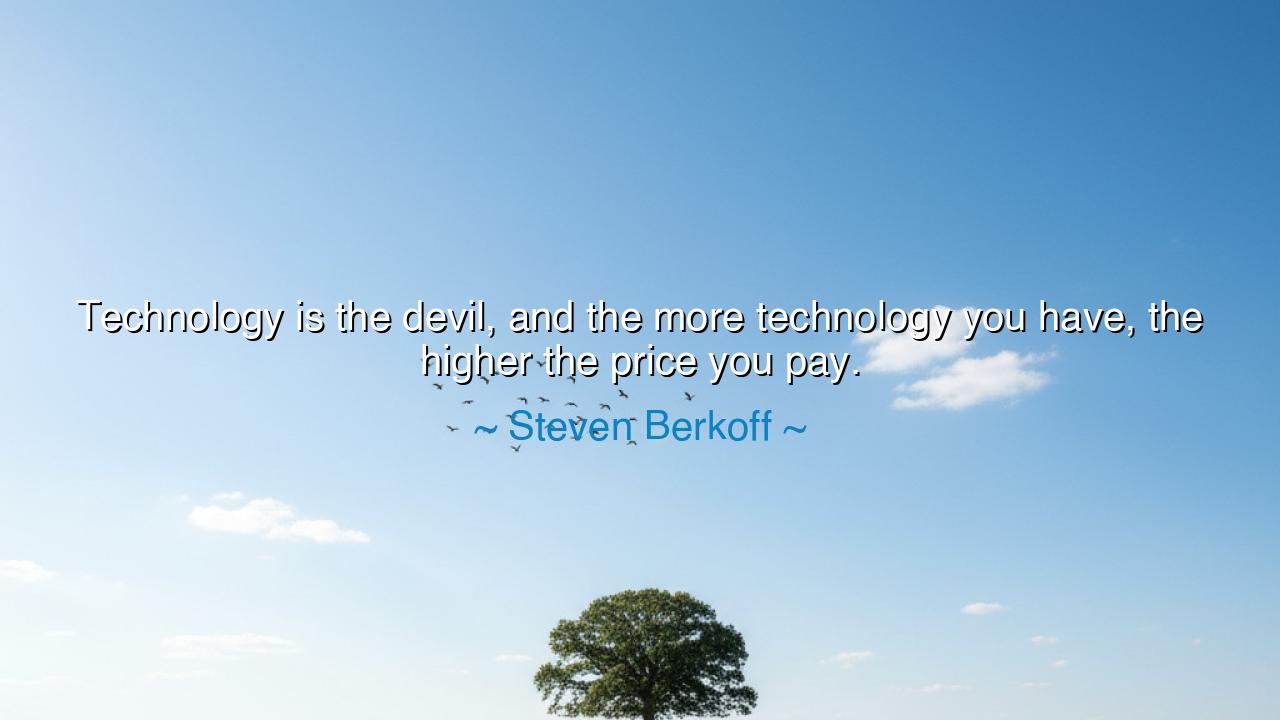
Technology is the devil, and the more technology you have, the
Technology is the devil, and the more technology you have, the higher the price you pay.






The actor and playwright Steven Berkoff once declared with fire and warning: “Technology is the devil, and the more technology you have, the higher the price you pay.” In these words lies a cry not against invention itself, but against the chains that unchecked technology may lay upon the spirit of man. It is an ancient truth spoken in modern terms — that every gift of power demands a toll, and that what appears as convenience may conceal a hidden cost. The devil is not in the wires or the screens, but in the seduction that lures mankind into dependency and forgetfulness of the soul.
From the earliest days, the ancients told stories of gifts from the gods that bore both light and burden. Prometheus stole fire, granting man the ability to cook, forge, and warm — yet also exposing him to destruction, war, and ruin. So too does Berkoff remind us that every step deeper into technology strengthens both our hand and our peril. With each new device we gain new strength, but also lose a measure of simplicity, of freedom, of quietude. The price is never merely in coins, but in the erosion of patience, the distraction of the mind, the surrender of privacy, and the weakening of human bonds.
Consider the tale of the Industrial Revolution. In the 19th century, the steam engine roared across nations, bringing speed and wealth unseen before. Cities grew, factories thrived, and empires expanded. But what was the price? The lungs of children blackened with coal dust, the rivers choked with poison, the laborers enslaved to the rhythm of machines. This is the devil Berkoff names: not the machine itself, but the cost hidden in its shadow. For every acceleration of power, there is a debt waiting to be paid.
Even in our own day, the glowing screen is our companion. The smartphone brings infinite knowledge to the palm, but the price is our attention, fractured and restless. Families sit together yet do not speak; children gaze into blue-lit mirrors instead of into each other’s eyes. We are bound by cords unseen, tethered not by chains of iron but by impulses of light. This too is the devil of which Berkoff warns — the subtle theft of presence, of peace, of the rhythm of life itself.
Yet we must not misunderstand his cry as a call to abandon all technology. For just as fire both warms and burns, technology both builds and destroys. The wisdom lies in vigilance — in remembering always that nothing is free. The more we grasp at invention, the more mindful we must be of the price. This price may be measured in pollution, in surveillance, in weakened health, in spiritual emptiness. To see the devil is to guard against him; to be blind is to be consumed.
The lesson for future generations is clear: do not worship technology as an idol, bowing before its gleaming altars. Instead, use it as a servant, never as a master. Ask not merely what power it grants, but what it takes away. Set aside the device to speak with your brother, to walk among the trees, to read by the quiet of the sun. Pay the price knowingly, not blindly, and you will keep your soul even as you use the tools of the age.
Thus, O seekers of wisdom, remember Berkoff’s warning: “Technology is the devil, and the more technology you have, the higher the price you pay.” Let this not be a call to fear, but a call to vigilance. Use the gifts of invention wisely, with restraint and purpose. For the devil waits not in the machine, but in the heart that forgets itself in pursuit of endless power. Guard your spirit, balance your tools, and you will walk in strength without losing your way.






AAdministratorAdministrator
Welcome, honored guests. Please leave a comment, we will respond soon